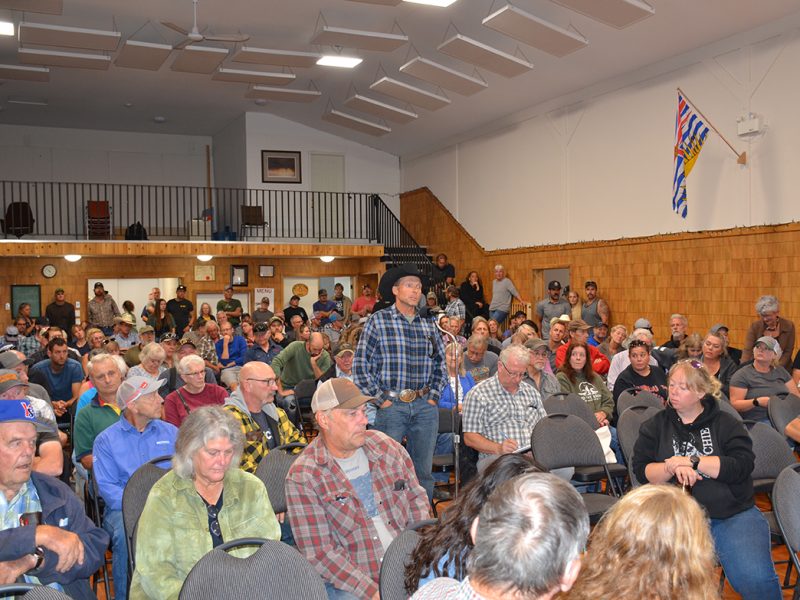Westwold producers rallied September 2 to challenge an August 15 provincial ban on irrigation for forage production in the lower Salmon River watershed east of Westwold.
The order signed by BC Minister of Forests Bruce Ralston, was issued under Section 88 of the Water Sustainability Act with a view to protecting the anticipated fall Chinook salmon run in the river. The order runs through September 30 but could be revoked if streamflows increase before then.
Similar orders were also issued for the Bessette Creek, the Tsolum and Koksilah watersheds.
The move has angered forage producers and livestock growers across the province, who were already facing drastic reductions in forage production as a result of this year’s deepening drought.
The meeting in Westwold attracted some 200 people, including BC United leader Kevin Falcon and six of his MLAs, who voiced frustration, anger and at times disgust, with the curtailment order, which followed one in 2021.
“This is not right,” says multi-generation rancher Trudy Schweb. “The fact that they figure fish are more important than cattle or dairy blows me away. Do they understand what this will do to us?”
Speakers talked of the impact that not being able to grow a third hay crop will have on their operations.
“This is usually the crop we can make money off,” says one.
Others like Schweb will be preparing pasture for cattle coming off of summer range, which has seen poor forage growth due to the drought conditions. Still others count on that third crop to feed their animals through the winter.
“Why should we have to be buying feed down in Washington when we can be growing it here?” asks Schweb.
Hay is in short supply in Western Canada due to a multi-year drought and prices are rising. This has triggered a sell-off of cattle ahead of the annual fall run as producers unload animals to avoid high feed costs.
“I was at the auction mart last week and talked to a lady who told me she couldn’t afford to feed her animals at $300 to $400 a ton for hay so she was selling them,” says Schweb.
The province claims “irrigation of forage crops is one of the most water-intensive agricultural water uses” and has exempted fruit and vegetable growers from the irrigation ban.
“You can water sweet corn but not feed corn,” notes Schwab. “How does that make sense?”
Several speakers at the Westwold meeting took issue with the lack of dialogue with government, despite a letter Schweb and 17 others sent to Ralston on August 19. There was no response to a follow-up letter on August 28, and a government representative did not attend the meeting in Westwold.
“To date we have had no reply to our requests for a meeting,” says Schweb.


 Corn rootworm hits Okanagan
Corn rootworm hits Okanagan